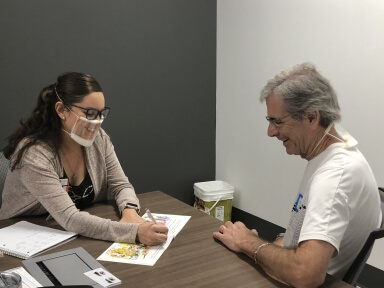The news of actor Bruce Willis’ aphasia diagnosis is drawing attention to a condition that is fairly common but not well understood by the general public.
Aphasia is a condition that affects a person’s ability to communicate. People with aphasia can have difficulty understanding or expressing themselves verbally, in writing — or both.
“Most people haven’t heard of it even though their chances of actually encountering it are relatively high,” said Cathy Torrington Eaton, PhD, CCC-SLP, assistant professor in the Department of Communication Sciences and Disorders in the School of Health Professions at UT Health San Antonio. “About one out of three people who suffer a stroke experience aphasia.”
Although stroke is the most common cause, aphasia can also occur due to traumatic brain injury or neurodegenerative disorders. There are two main types of aphasia.
“One type, expressive aphasia, affects your ability to express yourself, to find the words or sentence structure that you need,” she said. “The second type is receptive aphasia, where you hear something but have trouble understanding the meaning of it. It’s also possible to have both expressive and receptive aphasia.”
Once a person is diagnosed with aphasia, the primary treatment is speech-language therapy.
“There is no magic pill for treating aphasia,” Dr. Eaton said. “It’s really working with a speech-language pathologist to either directly address the underlying impairment or work around it so you are still able to communicate.”
Aphasia profoundly affects relationships, occupations and quality of life, Dr. Eaton said.
The Department of Communication Sciences and Disorders at UT Health San Antonio is hosting a summer program to help people with aphasia improve their communication skills. The free program offers three, two-week sessions in June and July.
“It’s a disorder that is really not understood, and we want to reach people who are feeling the effects because of the impact on quality of life,” she said. “The summer program is a way to meet other people with aphasia. It’ s a way to figure out quality of life while living with aphasia.”
For information about the summer program at UT Health San Antonio, visit: https://www.uthscsa.edu/academics/health-professions/departments/speech-language-pathology/free-speech-language-pathology-summer-clinic.
To determine eligibility and register for a session, email CSD-SLP@uthscsa.edu or call 210-450-8353.


